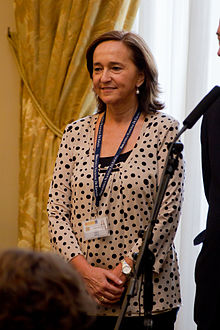
The Complutense University of Madrid is a public research university located in Madrid. Founded in Alcalá in 1293, it is one of the oldest operating universities in the world, and one of Spain's most prestigious institutions of higher learning. It is located on a sprawling campus that occupies the entirety of the Ciudad Universitaria district of Madrid, with annexes in the district of Somosaguas in the neighboring city of Pozuelo de Alarcón. It is named after the ancient Roman settlement of Complutum, now an archeological site in Alcalá de Henares, just east of Madrid.

Miguel Delibes SetiénMML was a Spanish novelist, journalist and newspaper editor associated with the Generation of '36 movement. From 1975 until his death, he was a member of the Royal Spanish Academy, where he occupied letter "e" seat. Educated in commerce, he began his career as a cartoonist and columnist. He later became the editor for the regional newspaper El Norte de Castilla before gradually devoting himself exclusively to writing novels.
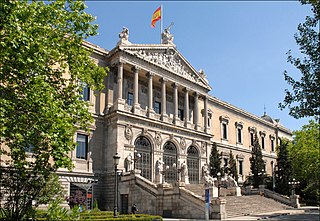
The Biblioteca Nacional de España is a major public library, the largest in Spain, and one of the largest in the world. It is located in Madrid, on the Paseo de Recoletos.
Juan Cobo OP was Spanish Dominican missionary, diplomat, astronomer and sinologist.
Blanca López de Mariscal or Blanca Guadalupe López Morales is a Professor emeritus and researcher in literature at Tecnológico de Monterrey, Campus Monterrey, México.
Jaime Alvar Ezquerra is a Spanish historian, author and professor at the Charles III University of Madrid, specializing in ancient history.
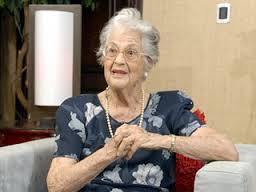
María de la Purificación Ugarte España was a Spanish-Dominican journalist, writer, academician, historian and palaeographer. Ugarte was the first woman who worked as a journalist in the Dominican Republic, and also the first woman to become a member of the Dominican Academy of History.

The Walls of Philip II were walls in the city of Madrid that Philip II, in 1566, constructed for fiscal and sanitary control. The walls enclosed an area of about 125 ha.

Santiago Muñoz Machado is a Spanish jurist and academic, director of the Royal Spanish Academy and the Association of Academies of the Spanish Language since 10 January 2019. As a jurist, he specialized in administrative and constitutional rights. He is also a member of the Royal Academy of Moral and Political Sciences and editor of the Diccionario del español jurídico and the Diccionario panhispánico del español jurídico.

José Félix Tezanos Tortajada is a Spanish sociologist, politician, and professor. He serves as political president of the Centro de Investigaciones Sociológicas (CIS) since 2018.

Eduardo González Calleja is a Spanish historian, professor of Contemporary History at the Charles III University of Madrid (UC3M). He is the author of a long list of scholar works dealing with political violence.
The Association of Church Librarians in Spain is a Spanish public association of a non-profit nature, founded in 1993 by the Episcopal Conference of Spain, for the defense, conservation, and diffusion of the bibliographic heritage of the Church in Spain. It is one of the 20 associations and professional associations members of the Spanish Federation of Archival, Library, Documentation, and Museum Societies. The Association is also a member of BETH - European Libraries of Theology. ABIE currently has about 60 members.
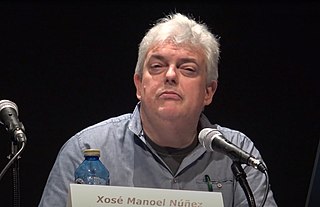
Xosé Manoel Núñez Seixas is a Spanish historian who specializes in nationalism studies, the cultural history of war and violence, and migration studies.

Francisco Alía Miranda is a Spanish historian. He has focused on the study of 20th century Spanish history. He has also published works dealing with the methodology of history.
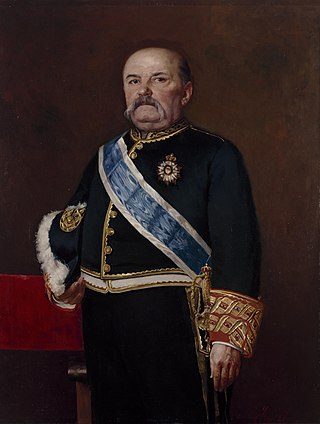
Manuel Becerra Bermúdez was a Spanish politician, mathematician and revolutionary. A Republican who would later embrace monarchism, he went on to assume the ministerial portfolios of Overseas and Development during the Sexenio Democrático, returning for two additional spells as Overseas minister during the regency of Maria Christina of Austria.
Julio Aróstegui Sánchez (1939–2013) was a Spanish historian. Professor at the Complutense University of Madrid (UCM), some of his research lines included the study of political violence in Modern Spanish history, Carlism, the Spanish Transition, the Spanish Civil War, the history of the workers' movement and collective memory. His scholar production also intertwined with the theoretical problems of history and the methodology of research.
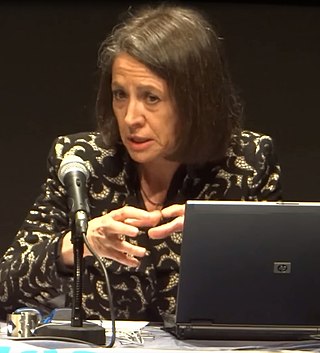
Ofelia Rey Castelao is a Galician historian, writer, and university professor. Focusing her research on women's history, she studies female migration and the insertion of Galician women in the literate culture. Rey Castelao was awarded the Premio Nacional de Historia de España in 2022.

